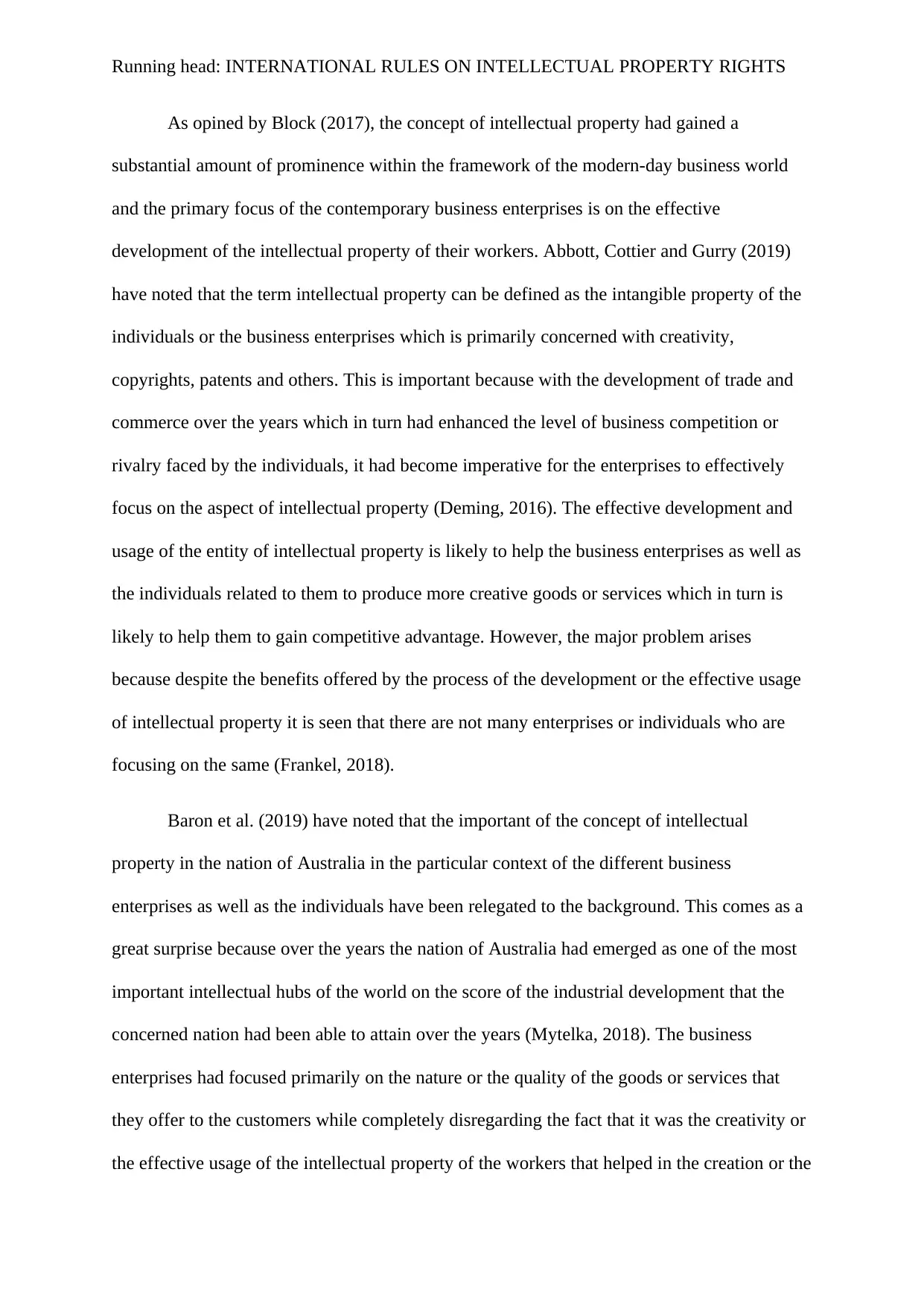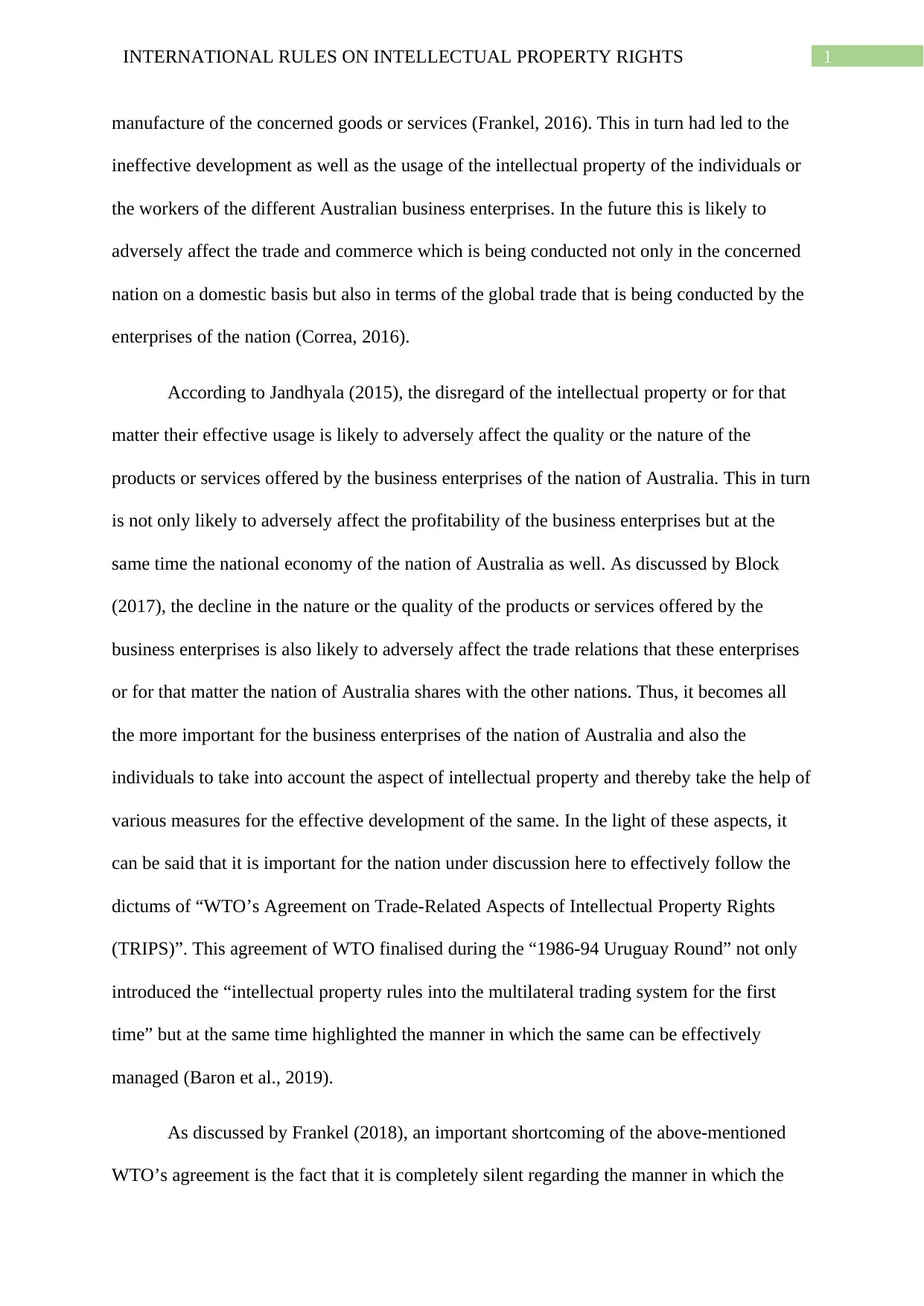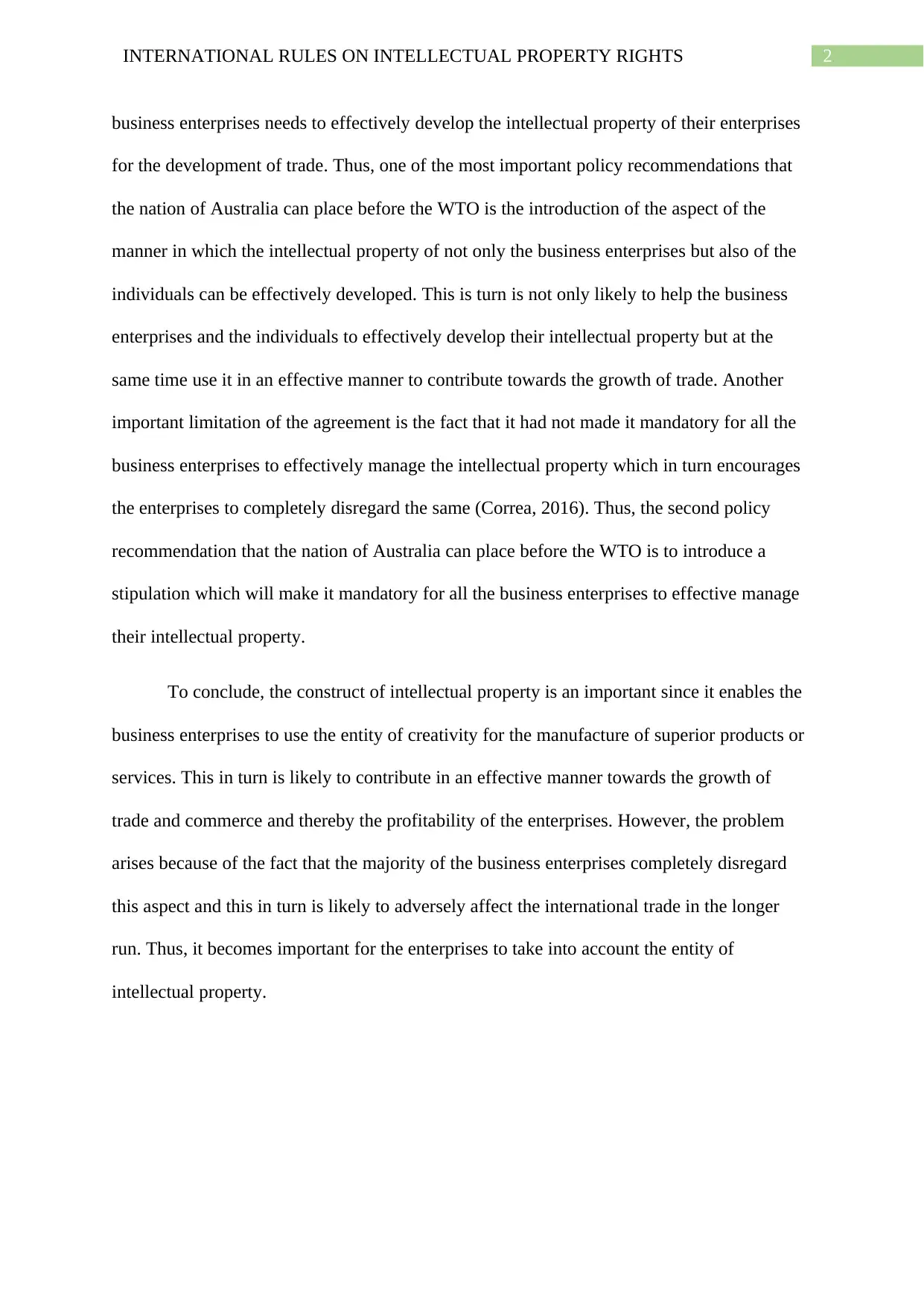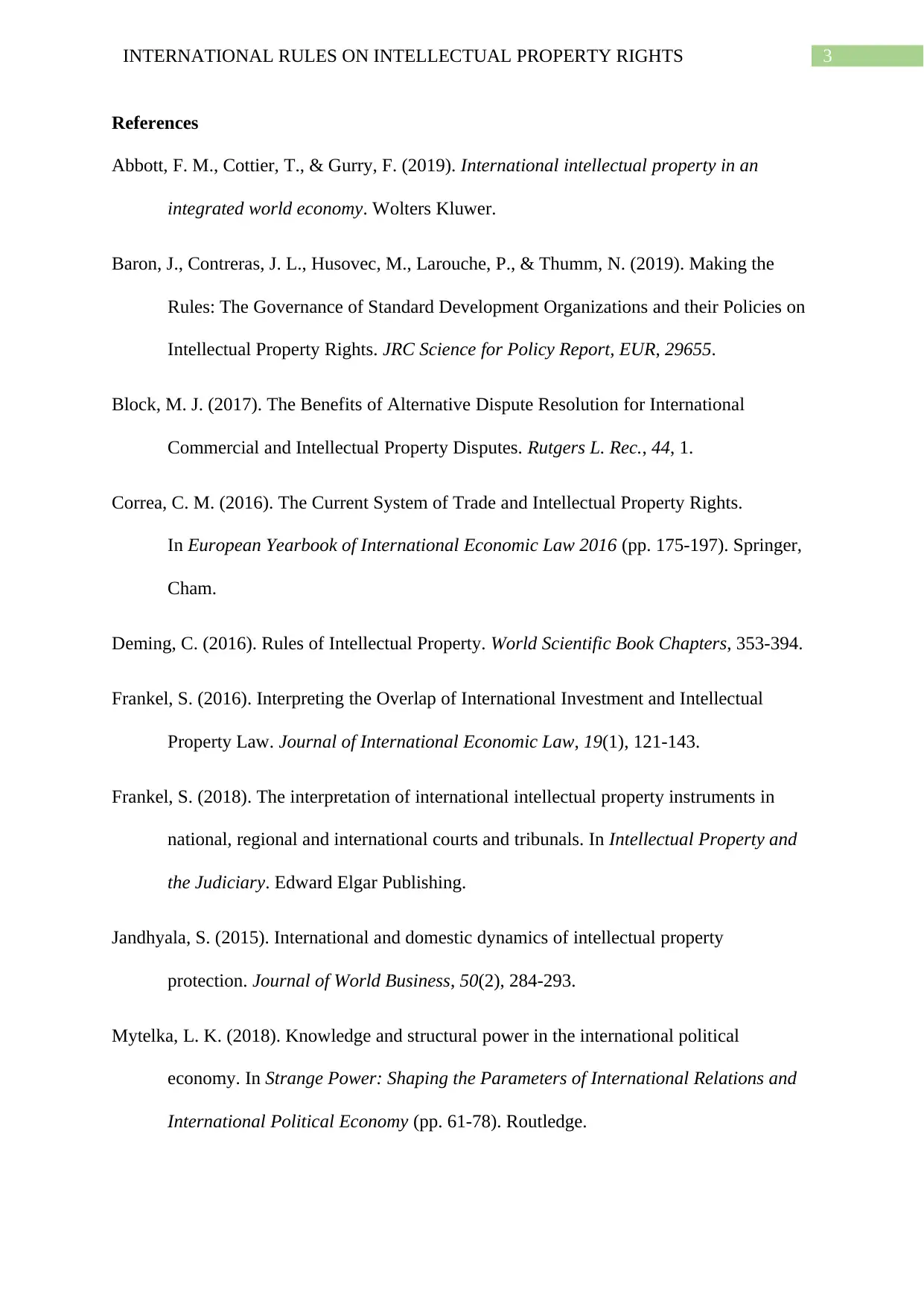WTO and Intellectual Property: Diplomatic Briefing and Policies
VerifiedAdded on 2023/01/11
|4
|1415
|54
Homework Assignment
AI Summary
This assignment presents a diplomatic briefing on international rules concerning intellectual property rights, focusing on the context of the World Trade Organization (WTO). The author, acting as a diplomat representing a chosen country (Australia), briefs their Minister on the importance of intellectual property in international trade, highlighting the impact of intellectual property on business competition, the development of creative goods and services, and the nation's trade relations. The briefing emphasizes the significance of the WTO’s Agreement on Trade-Related Aspects of Intellectual Property Rights (TRIPS), while also identifying its shortcomings, such as the lack of guidelines for enterprises to develop intellectual property. The assignment concludes with two policy recommendations: first, introducing guidelines for the development of intellectual property and second, mandating effective intellectual property management by all business enterprises to contribute towards the growth of trade and commerce.

Running head: INTERNATIONAL RULES ON INTELLECTUAL PROPERTY RIGHTS
As opined by Block (2017), the concept of intellectual property had gained a
substantial amount of prominence within the framework of the modern-day business world
and the primary focus of the contemporary business enterprises is on the effective
development of the intellectual property of their workers. Abbott, Cottier and Gurry (2019)
have noted that the term intellectual property can be defined as the intangible property of the
individuals or the business enterprises which is primarily concerned with creativity,
copyrights, patents and others. This is important because with the development of trade and
commerce over the years which in turn had enhanced the level of business competition or
rivalry faced by the individuals, it had become imperative for the enterprises to effectively
focus on the aspect of intellectual property (Deming, 2016). The effective development and
usage of the entity of intellectual property is likely to help the business enterprises as well as
the individuals related to them to produce more creative goods or services which in turn is
likely to help them to gain competitive advantage. However, the major problem arises
because despite the benefits offered by the process of the development or the effective usage
of intellectual property it is seen that there are not many enterprises or individuals who are
focusing on the same (Frankel, 2018).
Baron et al. (2019) have noted that the important of the concept of intellectual
property in the nation of Australia in the particular context of the different business
enterprises as well as the individuals have been relegated to the background. This comes as a
great surprise because over the years the nation of Australia had emerged as one of the most
important intellectual hubs of the world on the score of the industrial development that the
concerned nation had been able to attain over the years (Mytelka, 2018). The business
enterprises had focused primarily on the nature or the quality of the goods or services that
they offer to the customers while completely disregarding the fact that it was the creativity or
the effective usage of the intellectual property of the workers that helped in the creation or the
As opined by Block (2017), the concept of intellectual property had gained a
substantial amount of prominence within the framework of the modern-day business world
and the primary focus of the contemporary business enterprises is on the effective
development of the intellectual property of their workers. Abbott, Cottier and Gurry (2019)
have noted that the term intellectual property can be defined as the intangible property of the
individuals or the business enterprises which is primarily concerned with creativity,
copyrights, patents and others. This is important because with the development of trade and
commerce over the years which in turn had enhanced the level of business competition or
rivalry faced by the individuals, it had become imperative for the enterprises to effectively
focus on the aspect of intellectual property (Deming, 2016). The effective development and
usage of the entity of intellectual property is likely to help the business enterprises as well as
the individuals related to them to produce more creative goods or services which in turn is
likely to help them to gain competitive advantage. However, the major problem arises
because despite the benefits offered by the process of the development or the effective usage
of intellectual property it is seen that there are not many enterprises or individuals who are
focusing on the same (Frankel, 2018).
Baron et al. (2019) have noted that the important of the concept of intellectual
property in the nation of Australia in the particular context of the different business
enterprises as well as the individuals have been relegated to the background. This comes as a
great surprise because over the years the nation of Australia had emerged as one of the most
important intellectual hubs of the world on the score of the industrial development that the
concerned nation had been able to attain over the years (Mytelka, 2018). The business
enterprises had focused primarily on the nature or the quality of the goods or services that
they offer to the customers while completely disregarding the fact that it was the creativity or
the effective usage of the intellectual property of the workers that helped in the creation or the
Paraphrase This Document
Need a fresh take? Get an instant paraphrase of this document with our AI Paraphraser

1INTERNATIONAL RULES ON INTELLECTUAL PROPERTY RIGHTS
manufacture of the concerned goods or services (Frankel, 2016). This in turn had led to the
ineffective development as well as the usage of the intellectual property of the individuals or
the workers of the different Australian business enterprises. In the future this is likely to
adversely affect the trade and commerce which is being conducted not only in the concerned
nation on a domestic basis but also in terms of the global trade that is being conducted by the
enterprises of the nation (Correa, 2016).
According to Jandhyala (2015), the disregard of the intellectual property or for that
matter their effective usage is likely to adversely affect the quality or the nature of the
products or services offered by the business enterprises of the nation of Australia. This in turn
is not only likely to adversely affect the profitability of the business enterprises but at the
same time the national economy of the nation of Australia as well. As discussed by Block
(2017), the decline in the nature or the quality of the products or services offered by the
business enterprises is also likely to adversely affect the trade relations that these enterprises
or for that matter the nation of Australia shares with the other nations. Thus, it becomes all
the more important for the business enterprises of the nation of Australia and also the
individuals to take into account the aspect of intellectual property and thereby take the help of
various measures for the effective development of the same. In the light of these aspects, it
can be said that it is important for the nation under discussion here to effectively follow the
dictums of “WTO’s Agreement on Trade-Related Aspects of Intellectual Property Rights
(TRIPS)”. This agreement of WTO finalised during the “1986-94 Uruguay Round” not only
introduced the “intellectual property rules into the multilateral trading system for the first
time” but at the same time highlighted the manner in which the same can be effectively
managed (Baron et al., 2019).
As discussed by Frankel (2018), an important shortcoming of the above-mentioned
WTO’s agreement is the fact that it is completely silent regarding the manner in which the
manufacture of the concerned goods or services (Frankel, 2016). This in turn had led to the
ineffective development as well as the usage of the intellectual property of the individuals or
the workers of the different Australian business enterprises. In the future this is likely to
adversely affect the trade and commerce which is being conducted not only in the concerned
nation on a domestic basis but also in terms of the global trade that is being conducted by the
enterprises of the nation (Correa, 2016).
According to Jandhyala (2015), the disregard of the intellectual property or for that
matter their effective usage is likely to adversely affect the quality or the nature of the
products or services offered by the business enterprises of the nation of Australia. This in turn
is not only likely to adversely affect the profitability of the business enterprises but at the
same time the national economy of the nation of Australia as well. As discussed by Block
(2017), the decline in the nature or the quality of the products or services offered by the
business enterprises is also likely to adversely affect the trade relations that these enterprises
or for that matter the nation of Australia shares with the other nations. Thus, it becomes all
the more important for the business enterprises of the nation of Australia and also the
individuals to take into account the aspect of intellectual property and thereby take the help of
various measures for the effective development of the same. In the light of these aspects, it
can be said that it is important for the nation under discussion here to effectively follow the
dictums of “WTO’s Agreement on Trade-Related Aspects of Intellectual Property Rights
(TRIPS)”. This agreement of WTO finalised during the “1986-94 Uruguay Round” not only
introduced the “intellectual property rules into the multilateral trading system for the first
time” but at the same time highlighted the manner in which the same can be effectively
managed (Baron et al., 2019).
As discussed by Frankel (2018), an important shortcoming of the above-mentioned
WTO’s agreement is the fact that it is completely silent regarding the manner in which the

2INTERNATIONAL RULES ON INTELLECTUAL PROPERTY RIGHTS
business enterprises needs to effectively develop the intellectual property of their enterprises
for the development of trade. Thus, one of the most important policy recommendations that
the nation of Australia can place before the WTO is the introduction of the aspect of the
manner in which the intellectual property of not only the business enterprises but also of the
individuals can be effectively developed. This is turn is not only likely to help the business
enterprises and the individuals to effectively develop their intellectual property but at the
same time use it in an effective manner to contribute towards the growth of trade. Another
important limitation of the agreement is the fact that it had not made it mandatory for all the
business enterprises to effectively manage the intellectual property which in turn encourages
the enterprises to completely disregard the same (Correa, 2016). Thus, the second policy
recommendation that the nation of Australia can place before the WTO is to introduce a
stipulation which will make it mandatory for all the business enterprises to effective manage
their intellectual property.
To conclude, the construct of intellectual property is an important since it enables the
business enterprises to use the entity of creativity for the manufacture of superior products or
services. This in turn is likely to contribute in an effective manner towards the growth of
trade and commerce and thereby the profitability of the enterprises. However, the problem
arises because of the fact that the majority of the business enterprises completely disregard
this aspect and this in turn is likely to adversely affect the international trade in the longer
run. Thus, it becomes important for the enterprises to take into account the entity of
intellectual property.
business enterprises needs to effectively develop the intellectual property of their enterprises
for the development of trade. Thus, one of the most important policy recommendations that
the nation of Australia can place before the WTO is the introduction of the aspect of the
manner in which the intellectual property of not only the business enterprises but also of the
individuals can be effectively developed. This is turn is not only likely to help the business
enterprises and the individuals to effectively develop their intellectual property but at the
same time use it in an effective manner to contribute towards the growth of trade. Another
important limitation of the agreement is the fact that it had not made it mandatory for all the
business enterprises to effectively manage the intellectual property which in turn encourages
the enterprises to completely disregard the same (Correa, 2016). Thus, the second policy
recommendation that the nation of Australia can place before the WTO is to introduce a
stipulation which will make it mandatory for all the business enterprises to effective manage
their intellectual property.
To conclude, the construct of intellectual property is an important since it enables the
business enterprises to use the entity of creativity for the manufacture of superior products or
services. This in turn is likely to contribute in an effective manner towards the growth of
trade and commerce and thereby the profitability of the enterprises. However, the problem
arises because of the fact that the majority of the business enterprises completely disregard
this aspect and this in turn is likely to adversely affect the international trade in the longer
run. Thus, it becomes important for the enterprises to take into account the entity of
intellectual property.
⊘ This is a preview!⊘
Do you want full access?
Subscribe today to unlock all pages.

Trusted by 1+ million students worldwide

3INTERNATIONAL RULES ON INTELLECTUAL PROPERTY RIGHTS
References
Abbott, F. M., Cottier, T., & Gurry, F. (2019). International intellectual property in an
integrated world economy. Wolters Kluwer.
Baron, J., Contreras, J. L., Husovec, M., Larouche, P., & Thumm, N. (2019). Making the
Rules: The Governance of Standard Development Organizations and their Policies on
Intellectual Property Rights. JRC Science for Policy Report, EUR, 29655.
Block, M. J. (2017). The Benefits of Alternative Dispute Resolution for International
Commercial and Intellectual Property Disputes. Rutgers L. Rec., 44, 1.
Correa, C. M. (2016). The Current System of Trade and Intellectual Property Rights.
In European Yearbook of International Economic Law 2016 (pp. 175-197). Springer,
Cham.
Deming, C. (2016). Rules of Intellectual Property. World Scientific Book Chapters, 353-394.
Frankel, S. (2016). Interpreting the Overlap of International Investment and Intellectual
Property Law. Journal of International Economic Law, 19(1), 121-143.
Frankel, S. (2018). The interpretation of international intellectual property instruments in
national, regional and international courts and tribunals. In Intellectual Property and
the Judiciary. Edward Elgar Publishing.
Jandhyala, S. (2015). International and domestic dynamics of intellectual property
protection. Journal of World Business, 50(2), 284-293.
Mytelka, L. K. (2018). Knowledge and structural power in the international political
economy. In Strange Power: Shaping the Parameters of International Relations and
International Political Economy (pp. 61-78). Routledge.
References
Abbott, F. M., Cottier, T., & Gurry, F. (2019). International intellectual property in an
integrated world economy. Wolters Kluwer.
Baron, J., Contreras, J. L., Husovec, M., Larouche, P., & Thumm, N. (2019). Making the
Rules: The Governance of Standard Development Organizations and their Policies on
Intellectual Property Rights. JRC Science for Policy Report, EUR, 29655.
Block, M. J. (2017). The Benefits of Alternative Dispute Resolution for International
Commercial and Intellectual Property Disputes. Rutgers L. Rec., 44, 1.
Correa, C. M. (2016). The Current System of Trade and Intellectual Property Rights.
In European Yearbook of International Economic Law 2016 (pp. 175-197). Springer,
Cham.
Deming, C. (2016). Rules of Intellectual Property. World Scientific Book Chapters, 353-394.
Frankel, S. (2016). Interpreting the Overlap of International Investment and Intellectual
Property Law. Journal of International Economic Law, 19(1), 121-143.
Frankel, S. (2018). The interpretation of international intellectual property instruments in
national, regional and international courts and tribunals. In Intellectual Property and
the Judiciary. Edward Elgar Publishing.
Jandhyala, S. (2015). International and domestic dynamics of intellectual property
protection. Journal of World Business, 50(2), 284-293.
Mytelka, L. K. (2018). Knowledge and structural power in the international political
economy. In Strange Power: Shaping the Parameters of International Relations and
International Political Economy (pp. 61-78). Routledge.
1 out of 4
Related Documents
Your All-in-One AI-Powered Toolkit for Academic Success.
+13062052269
info@desklib.com
Available 24*7 on WhatsApp / Email
![[object Object]](/_next/static/media/star-bottom.7253800d.svg)
Unlock your academic potential
Copyright © 2020–2025 A2Z Services. All Rights Reserved. Developed and managed by ZUCOL.





